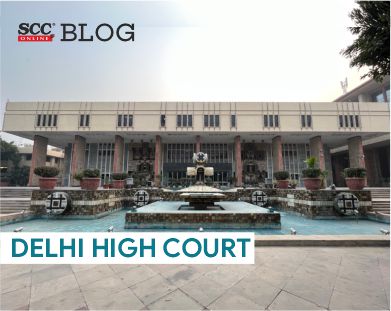Delhi High Court: In a case where a petition was filed under Section 11 of the Arbitration and Conciliation Act, 1996 for appointment of a sole arbitrator for the resolution of disputes between the parties, a Single Judge Bench of V. Kameswar Rao, J. held that the moratorium granted by the NCLAT staying the institution of suits and proceedings after the resolution process was initiated under Sections 241 and 242 of the Companies Act, 2013 was similar to an order of moratorium passed under Section 14 of the Insolvency and Bankruptcy Code, 2016 (IBC).
Background
The petitioner entered into a cost sharing agreement with Haryana Urban Development Authority (HUDA) for external development works for improvement of certain road networks in Gurgaon, Haryana. Subsequently, the petitioner entered into a separate contract agreement in 2012 with the respondent with a contract period of 24 months. The petitioner said the project could not be completed for various defaults and disputes arose in 2018 about certain works to be completed/rectified by the respondent. Meanwhile, the Union of India in a petition under Sections 241 and 242 of the Companies Act, 2013 moved the NCLT praying for stay of institution and continuation of suits and other proceedings against IL&FS and its 348 Group Companies. The NCLT declined to grant relief and in appeal, the NCLAT in 2018 stayed the institution and continuation of suits and other proceedings against IL&FS and its 348 Group Companies. In 2021, the petitioner issued a notice under Section 21 of Arbitration and Conciliation Act, 1996 (Act) invoking the arbitration clause. The same was objected to by the respondent in 2021, stating that the invoking of arbitration was impermissible.
Submissions on behalf of the Petitioner
The petitioner contended that there was no ‘unpaid operational debt’ or any other debt recoverable under the IBC and therefore, the petitioner could not be termed to be an ‘operational creditor’. Moreover, the counsel for the petitioner submitted that the ‘moratorium’ granted by the NCLAT was not a statutory moratorium under Section 14 of the IBC and resolution was not being conducted under the IBC, but under Sections 241 and 242 of the Companies Act, 2013.
Submissions on behalf of the Respondent
The respondent stated that the present petition was not maintainable as the petition under Section 9 of IBC was already pending before the NCLT. Further, it was stated that the respondent was a part of the IL&FS Group and was subject to a moratorium under Sections 241 and 242 of the Companies Act, 2013. Moreover, it was stated that the petitioner issued a notice under Section 21 of the Act only after a lapse of 6 months from the deadline and therefore, it was evident that neither any claims nor any disputes had arisen between the parties and the claims had been raised by the petitioner only to counter blast the proceedings under Section 9 of the IBC, initiated by the respondent.
Analysis, Law, and Decision
The Court noted that the matter being lis pendens before the Supreme Court, therefore, it was not for this Court to sit in appeal and comment on the veracity of the order passed by the NCLAT, specifically in a petition under Section 11 of the Act.
The Court relied on APCO-Titan (JV) v. National Highways and Infrastructure Development Corporation Ltd., 2019 SCC OnLine Del 10700, wherein this Court had held that the suit therein would not be maintainable against a group company of IL&FS. The Court noted that the issue which arose for consideration was ‘whether arbitration was permissible with regards to petitioner’s claims arising in 2018 and 2020’.
The Court relied on VIL Ltd. v. IL&FS Transporation Networks, 2018 SCC OnLine HP 3076, wherein the High Court of Himachal Pradesh held that “Order passed by Appellate Tribunal under Sections 241 and 242 of the Companies Act, 2013 was similar to the order passed under Section 14 of the IBC providing declaration of moratorium, as prima facie the Appellate Tribunal had considered that it had wider power under Sections 241 and 242 of the Companies Act, 2013, than the power vested under provisions of the Code”.
The Court opined that “Order passed by the NCLAT was akin to an order of moratorium under Section 14 of the IBC. The purpose and rationale behind granting a moratorium was to ensure that the assets of the corporate debtor were protected, with an intention to keep the company a going concern and to use the period to strengthen its financial position. It meant that the intent of the NCLAT was to protect the assets of IL&FS and its group companies to make resolution process effective/purposeful”.
Further, the Court held that “the NCLAT not just restrained continuance of suits or proceedings already instituted, but also the filing of fresh suits or proceedings. In other words, the order of stay/moratorium prohibits the initiation of any proceedings, regardless of the period to which the claims in the proceedings pertain”.
Therefore, the Court dismissed the petition.
[DLF Ltd. v. IL&FS Engineering and Construction Co., 2022 SCC OnLine Del 4509, decided on 21-12-2022]
Advocates who appeared in this case:
For the Petitioner: Senior Advocate Rajiv Nayar;
Advocate Dhruv Divan;
Advocate Meghna Mishra;
Advocate Ankit Rajgarhia;
Advocate Tarun Mehta;
For the Respondent: Senior Advocate Jayant Mehta;
Advocate Kaushik Laik;
Advocate Akshay Kaushik;
Advocate Rudrakshi Deo;
Advocate Abhishek Tiwari.






